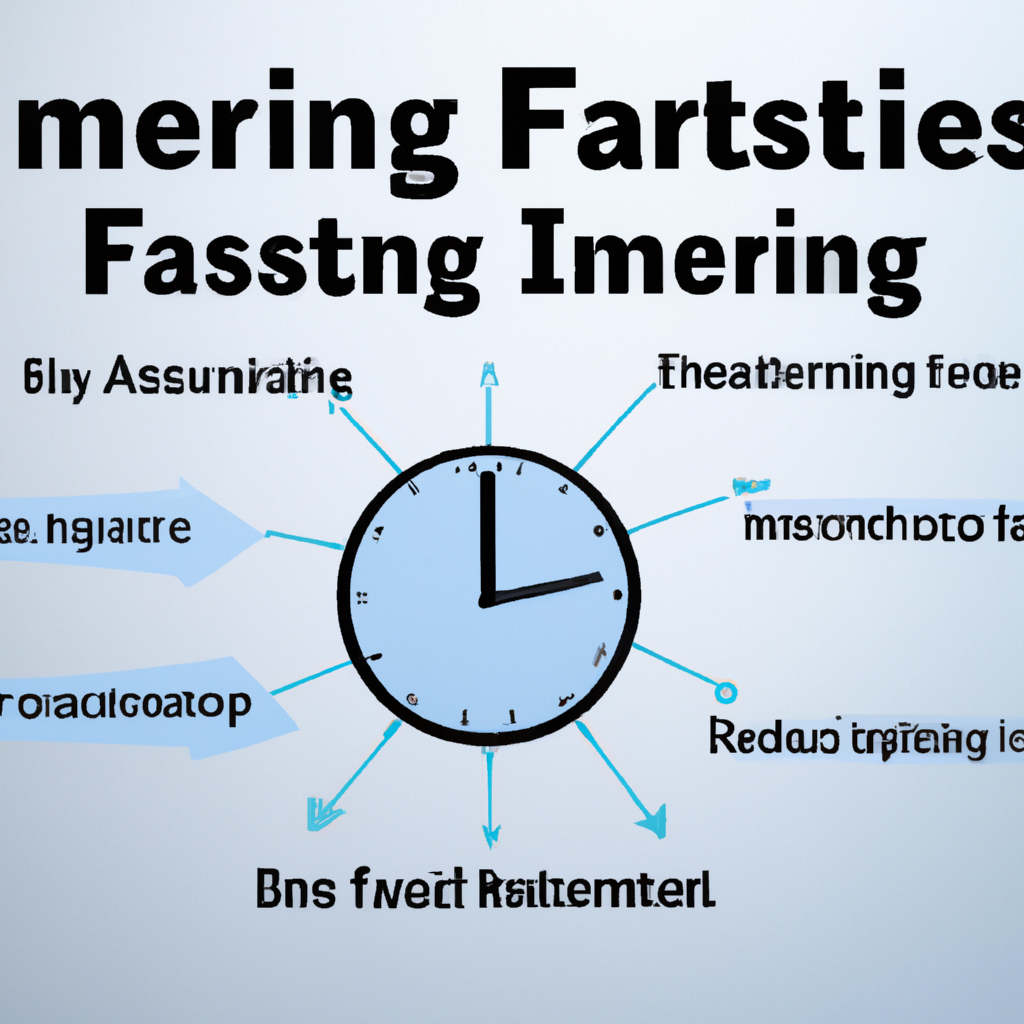How do you feel about fasting? Is it just something done in religious ceremonies, or is there something more to it? Maybe you’ve heard of the term “intermittent fasting,” and are wondering if it could be beneficial to you. In this article, we’ll discuss the various health effects and variations of intermittent fasting and find out how this diet could make a difference to your daily routine.
1. “Harnessing the Power of Time: Unveiling the Health Effects of Intermittent Fasting”
Intermittent fasting has gained a great deal of attention lately as people begin to understand its potential health benefits and harness its power. From increased physical benefits including improved cardiovascular health, to improved mental benefits, like increased productivity and focus, the possibilities of intermittent fasting are truly powerful. Here we’ll explore what intermittent fasting is, the health benefits behind it, and how to reap the maximum benefits.
What is Intermittent Fasting?
Intermittent fasting is a type of eating pattern that cycles between periods of fasting and eating. It does not restrict what you eat, but it restricts when you eat. There are a few different types of intermittent fasting, such as:
- The 16/8 method: Limit eating to an eight-hour window and fast for the remaining 16 hours.
- 5:2 diet: Eat normally five days a week and then fast two days a week.
- Alternate-day fasting: Fast every other day.
The Health Benefits of Intermittent Fasting
The potential health benefits of intermittent fasting are numerous. Here are a few of the most notable:
- Weight loss: Intermittent fasting is thought to be an effective way to reduce body weight.
- Improved cognitive function: Studies suggest that intermittent fasting can improve key brain chemicals related to the formation of new memories and learning.
- Improved cardiovascular health: Research suggests that intermittent fasting can reduce cholesterol levels, blood pressure, and levels of certain inflammation-related markers.
- Reduced inflammation: Intermittent fasting can help reduce systemic inflammation, which is linked to a number of chronic and degenerative conditions.
Harnessing the Power of Intermittent Fasting
To reap the greatest benefits of intermittent fasting, it is important to create a routine and be consistent. Start by deciding which type of intermittent fasting is best suited to your lifestyle and goals. Once you have chosen a routine, stick to it and track your progress. Try reducing your eating window and increasing the amount of time you fast until you reach a balanced routine that makes you feel good. Finally, remember to stay hydrated and get plenty of sleep. This will help you stay on track and maximize the benefits of fasting.
Conclusion
Intermittent fasting has many potential health benefits, but for best results, it’s important to create a routine and stick to it. With the right routine and approach, you can harness the power of intermittent fasting to improve your physical and mental health.
2. “Beyond Starvation: Unlocking the Different Variations of Intermittent Fasting”
Intermittent fasting has exploded into an industry of its own, and it’s easy to see why: this method of fasting can offer immense physical, mental, and emotional benefits. However, beyond the traditional fasting of alternating day lengths, there are even more variations to try. Each of these variants will come with its own unique benefits, so don’t be afraid to experiment!
Alternate Day Fasting: This is the classic intermittent fasting protocol, which entails alternating day lengths of zero calorie consumption to ensure you are “fasting” for at least one day a week.
- This approach has been found to result in improved athletic performance.
- It can also result in increased focus.
- Finally, some studies suggest that this variation can lead to a reduction in body fat.
Modified Alternate Day Fasting: This is slightly more forgiving than the standard approach. Rather than simply going without food for a day, you fast for a day, and then have a 20–25% (of daily caloric requirements) meal on the following day.
- It can help you to achieve weight loss without sacrificing lean muscle.
- Regular practice has been linked to improved cardiovascular health.
- Furthermore, cognitive performance has been shown to increase for those who practice this variation of fasting.
5:2 Diet: This is a classic approach that has been used to great effect for people looking to trim a few pounds. Here, you limit your calorie intake to 500–600 calories for two days a week, and then consume your regular diet for the other five days.
- Studies have found that, in combination with exercise, it can actually slow the aging process of your cells.
- This approach has been linked to a decrease in inflammation.
- Finally, this variation of fasting can even help to preserve muscle while you trim down.
These three variations of intermittent fasting are just the beginning. As you’re exploring the realm of fasting, you’ll find even more methods of practice. Remember to stay smart and pay attention to your body as you find the fasting version that works best for you!
3. “Feasting on Breaks: Exploring the Surprising Benefits of Intermittent Fasting”
Recent studies have suggested that intermittent fasting, or the practice of only eating during certain times of the day or during certain days of the week, can have a host of benefits for your overall health and wellbeing.
Research has shown that caloric restriction in intermittent fasting has been found to improve insulin sensitivity, reduce inflammation, and reduce oxidative stress on the cells in your body. This can lead to better brain function, increased energy levels, improved fat burning and enhanced metabolic flexibility in the body – allowing you to better manage stress and absorb nutrients more easily.
Moreover, intermittent fasting has also been linked to a number of other health benefits, including:
- Lowering bad cholesterol (LDL) and raising good cholesterol (HDL)
- Reducing blood sugar and insulin levels for better diabetes management
- Reducing your risk of stroke, heart disease, and other chronic diseases
- Decreasing the risk of Alzheimer’s and other neurodegenerative diseases
In addition, research has found that intermittent fasting also has psychological benefits, such as increased focus and improved mood, as well as improved cognitive function and protection of the brain from degeneration.
The idea of fasting for extended periods of time may seem daunting at first, but with the right strategies in place, it can be an easy and effortless way to boost your health and overall wellbeing.
4. “Intermittent Fasting: From Ancient Traditions to Modern Adaptations
Fasting: A Centuries-Old Practice
Intermittent fasting has been part of traditional human culture for centuries. Ancient cultures commonly practiced fasting on religious holidays, as a form of spiritual cleansing and purification. Pre-industrial cultures used fasting as a way to adjust to extreme environmental conditions, from drought to famine and even war. The ancient Greeks and Romans practiced fasting as a way to boost physical and mental performance.
The modern version of intermittent fasting has been gaining popularity in recent years, with science indicating potential benefits. According to researchers, fasting has been shown to promote cellular repair and decrease inflammation, both of which can lead to better overall health. Additionally, studies have shown that fasting can improve weight loss and protect against chronic diseases.
Types of Intermittent Fasting
- Alternate-Day Fasting – Fasting on alternating days
- Time-Restricted Eating – Fasting for certain hours each day
- Whole-Day Fasting – A single longer fasting period
Whether it’s used for health benefits or spiritual cleansing, intermittent fasting has been shown to have advantages. Modern science has shown promise in terms of its ability to improve weight loss, reduce inflammation, and more. However, dieters should understand the basics of intermittent fasting before jumping into this fasting routine.
The Benefits of Intermittent Fasting
- Weight Loss – A study found that intermittent fasting can reduce body fat and lean muscle mass
- Improved Insulin Sensitivity – Fasting can lead to improved insulin sensitivity and glucose metabolism
- Lower Risk of Chronic Diseases – Fasting can reduce inflammation, which in turn can reduce the risk of chronic diseases
- Longevity – Studies have shown that fasting can reduce the risk of age-related diseases
Intermittent fasting is not for everyone, and it’s important to consult with a doctor or nutritionist before beginning any type of diet. However, with its potential benefits, it may be worth a try for dieters looking for a way to improve their health.
Intermittent fasting is a very flexible eating pattern that can help you achieve health and lifestyle goals. Research suggests that intermittent fasting can have positive effects on weight loss, metabolic health, blood sugar balance, and overall health. It’s important to consider all the variations of intermittent fasting before deciding whether it’s right for you. Regardless of the approach you choose, careful planning and monitoring of food intake and health is a must. With wise and mindful application of intermittent fasting, you can find the perfect balance between your physical, mental, and emotional wellbeing.



